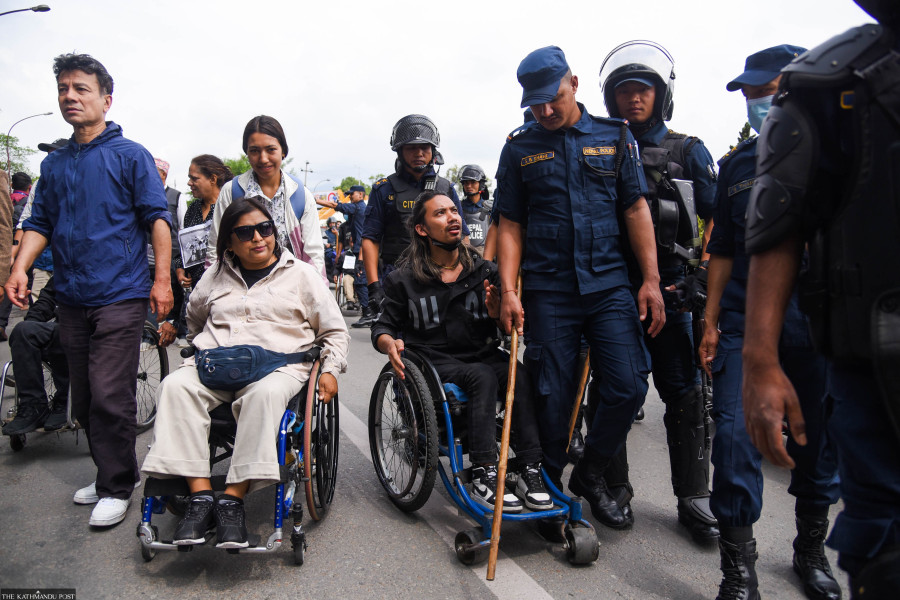National
People with disabilities demand personal assistance services
NHRC has accused the police of using excessive force even as people with disabilities were protesting for their rights.
Manushree Mahat
At Shanti Vatika, Ratnapark, underneath a tent barely keeping out the midday summer sun, people with disabilities are seen huddled together. It’s been 20 days since the protesters asked for a few simple things—mainly that personal assistant services be provided to those who need them.
Personal assistant services involve help for people with disabilities in their day-to-day activities. From helping them to shower and dress-up, to driving them around—these services play a vital role in improving the quality of life of people with disabilities.
In the ongoing protests at Ratnapark, people with all kinds of disability—wheelchair users, deafblind people, visually and hearing impaired individuals—have made their appearance. And things are looking bleak, especially after the police used excessive force on those coming out on the streets to demonstrate.
Bhojraj Shrestha, a wheelchair user, has been part of the protest since day one. Everyday he wonders when he’ll get adequate help to perform simple day-to-day activities. Once he wakes up, he needs to get in his wheelchair, shower, and go out of the house to work. To do all that, he needs help and care. But that help has not been coming, at least not from the government.
“Our rights are already enshrined in the law, but what’s the point when there is no implementation?” says Shrestha.
The protesters’ demands include provision of personal assistant services in the upcoming fiscal budget to meet the needs and requirements of persons with disabilities. According to Chapter 3, section 9(2) of the Act relating to the rights of Persons with Disabilities, “The persons with disabilities shall have the right to obtain assistive materials and community assistance in order to earn the living respectfully.”
The protesters want this right honoured.
Lhakpa Nuru Sherpa is the father to a 15-year-old deafblind boy. The family looks after their son, but it isn’t always easy. The son has the right to education as any other child, but when getting him ready for school is so difficult, how is he supposed to enjoy that basic right?
“If the government gives us a helper, my son can go to school more easily and enjoy his other rights. A personal caregiver and assistance is all we ask for, which would make a world of difference,” says Sherpa.
To make matters worse, on May 15, the police used excessive force on the protesters as they marched from Ratnapark to Maitighar.
Bhojraj Shrestha, the wheelchair user, was present that day amid the heckling police officers. The fact that the police had to use force against protesters who were only asking for the fulfilment of their rights enshrined in the constitution confounds him.
Sherpa was among the protesters hounded by the police on May 15. Gashes line his arms and hands.
The National Human Rights Commission (NHRC) condemned the excess use of force while trying to crowd control and manage traffic. Among the protesters, 20 were arrested, and seven hospitalised. Ramesh Khadka, a hearing and speech impaired person, needed a CT scan after his neck was bruised, a police constable kicked a woman with disability in her stomach, while the police heckled a 15-year-old deafblind boy on the assumption that he was faking his disability.
SSP Dan Bahadur Karki, spokesperson for the Nepal Police, said crowd control and management is part of police duty but the goal is to lead the protesters through certain routes to prevent trouble for passerby and vehicles.
“The problems that occurred were the result of trying to control the crowd during the protest. The police don't use such violence especially against people with disabilities,” Karki said.
However, protesters, as well as the NHRC, spoke of unwanted police violence.
Bikash Thapa, an organiser of the Disability Rights Implementation Street Movement Struggle Committee, says all the protesters are looking for is for their rights enshrined in the constitution to be honoured.
“Why are the police preventing us from exercising our right to protest?” says Thapa.
Despite what happened that day, the protesters are prepared to continue their fight for justice.
The Ministry of Women, Children, and Senior Citizens says the protesters’ demands have already been processed and sent to the Ministry of Finance.
The proposal requires the finance ministry’s nod as personal assistance providers for people with disabilities have to be paid.
Sherpa believes that with adequate opportunities, and means to exercise them, people with disabilities can excel in life.
“The government needs to stop viewing people with disabilities as a burden,” Sherpa says. “After all, we will use the care provided by the government to improve our personal lives and to contribute to the country as a whole.”
On May 20, the protesters are preparing for a huge rally with expected participation of people with disabilities from all over Nepal.




 20.53°C Kathmandu
20.53°C Kathmandu















